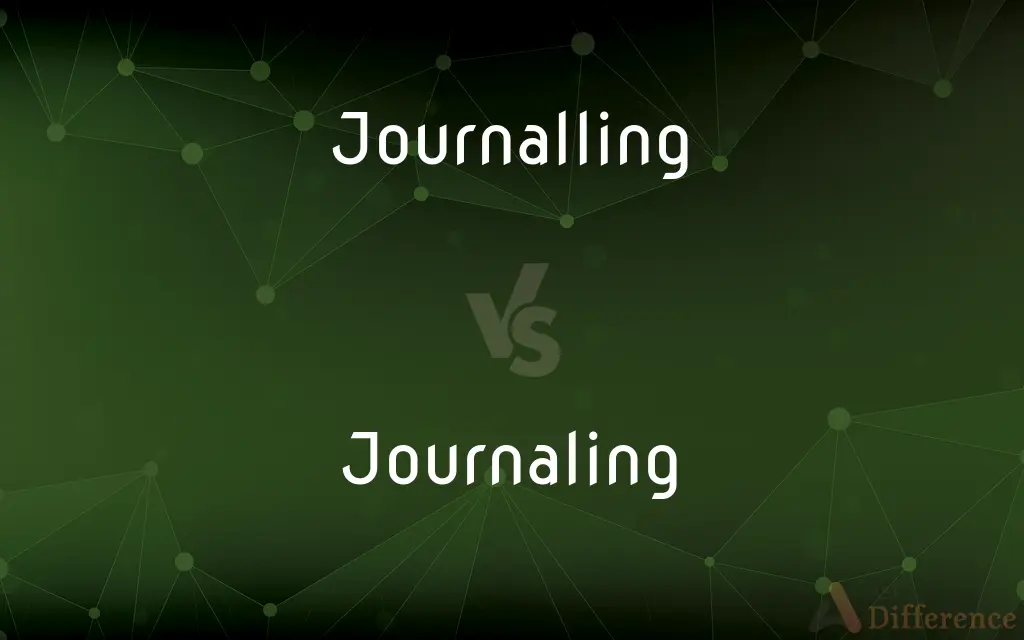Journalling vs. Journaling — What's the Difference?
By Tayyaba Rehman & Urooj Arif — Published on December 22, 2024
Journalling emphasizes a double 'l' spelling variant, common in British English, focusing on the act of keeping a diary. Journaling, with one 'l', is preferred in American English, denoting the same habit of recording personal experiences.

Difference Between Journalling and Journaling
Table of Contents
ADVERTISEMENT
Key Differences
Journalling, with its double 'l', reflects the British English spelling convention, which often includes additional letters in words compared to American English. This variant is more commonly seen in British publications and writings, highlighting regional spelling preferences. On the other hand, journaling, spelled with a single 'l', adheres to American English spelling rules. It is widely accepted in American publications and educational materials, illustrating the simplicity often found in American English spellings.
Journalling is not just about the spelling; it also embodies the cultural nuances of English as used in the UK. This includes not only language but also the cultural context in which journaling practices might be discussed or encouraged. Whereas journaling in American English, while similar in practice, is often associated with a broader range of self-help and personal development cultures that are particularly vibrant in the United States.
When it comes to digital platforms and international publications, the spelling "journaling" with one 'l' is becoming increasingly dominant. This is partly due to the global influence of American English through technology and social media. Conversely, "journalling" remains a testament to the linguistic diversity within the English language, serving as a reminder of the rich variations in spelling and usage across English-speaking countries.
In educational contexts, the spelling used can indicate the version of English being taught or followed. British schools and textbooks may prefer "journalling," reinforcing British spelling and grammar rules. On the other hand, American educational materials will certainly use "journaling," aligning with the General American English standards.
The choice between "journalling" and "journaling" can also reflect personal preference or the influence of specific writing guides or dictionaries. Some individuals might choose "journalling" to align with British English conventions they are more familiar with, while others may opt for "journaling" due to its prevalence in American media and digital content.
ADVERTISEMENT
Comparison Chart
Spelling
Double 'l'
Single 'l'
Preferred Region
United Kingdom
United States
Associated With
British publications
American publications
Educational Materials
British schools
American schools
Global Influence
Less dominant
More dominant
Compare with Definitions
Journalling
A practice involving writing down future goals and aspirations.
Journalling her goals made her more committed to achieving them.
Journaling
The process of keeping a personal log of activities, thoughts, or feelings.
Journaling has become a crucial part of her morning routine.
Journalling
The act of regularly recording one's thoughts and experiences in a diary.
She found that journalling her thoughts every evening helped her manage stress.
Journaling
A strategy for tracking progress towards personal objectives.
He used journaling to track his fitness journey.
Journalling
A method used for self-reflection and personal growth.
His therapist recommended journalling as a way to process his emotions.
Journaling
An exercise for developing self-discipline and mindfulness.
Daily journaling helped him become more mindful of his actions.
Journalling
A technique for improving writing skills and creativity.
She took up journalling to explore her creative writing style.
Journaling
A tool for enhancing mental health and emotional well-being.
She started journaling to cope with her anxiety.
Journalling
A therapeutic activity to record daily experiences and feelings.
Journalling about his day helped him find the positive moments.
Journaling
A practice for capturing memories and significant life events.
Journaling his travels created a personal memoir of his adventures.
Journalling
Alternative form of journaling
Journaling
A personal record of occurrences, experiences, and reflections kept on a regular basis; a diary.
Journaling
An official record of daily proceedings, as of a legislative body.
Journaling
To write one's observations or thoughts in a journal
Spent all day journaling about the trip.
Journaling
The activity of keeping a diary, or journal.
Common Curiosities
Do I need to write in my journal every day?
No, there's no strict rule. The frequency of journaling depends on personal preference and goals.
Can journaling help with anxiety?
Yes, journaling can help manage anxiety by allowing individuals to clarify their thoughts and concerns.
Is journaling only about writing, or can it include other forms of media?
Journaling can include writing, sketches, photos, and other media to record experiences and reflections.
What is the main difference between journalling and journaling?
The main difference is in spelling: "journalling" uses double 'l', following British English conventions, while "journaling" uses a single 'l', as per American English standards.
What are the benefits of journaling for students?
Benefits for students include improved writing skills, better memory retention, and stress reduction.
How does journaling aid in personal development?
Journaling aids in personal development by encouraging self-reflection, goal setting, and mindfulness.
How can journaling improve creativity?
Journaling can enhance creativity by providing a space to explore ideas without judgment.
Is it necessary to follow a specific structure while journaling?
No, there's no required structure; journaling can be free-form or structured, depending on personal preference.
Can journalling improve mental health?
Yes, journalling can improve mental health by providing an outlet for expressing thoughts and feelings.
Can journalling be done digitally?
Yes, journalling can be done digitally using apps or digital diaries, offering convenience and privacy.
Is journalling more common in specific age groups?
Journalling is a versatile practice enjoyed by people of all ages, without specific age restrictions.
Can journalling be considered a form of meditation?
Yes, journalling can be a meditative practice as it encourages focus, reflection, and presence in the moment.
How does journaling differ from keeping a diary?
Journaling and keeping a diary are similar, but journaling often focuses more on thoughts, feelings, and reflections, whereas a diary might be more about daily events.
What materials do I need to start journaling?
All you need is something to write with and on, whether a notebook and pen or a digital device.
Can journalling help with goal setting?
Yes, journalling can be an effective way to articulate, track, and reflect on personal goals and progress.
Share Your Discovery

Previous Comparison
Monocot Stem vs. Dicot Stem
Next Comparison
Bifocal Lenses vs. Varifocal LensesAuthor Spotlight
Written by
Tayyaba RehmanTayyaba Rehman is a distinguished writer, currently serving as a primary contributor to askdifference.com. As a researcher in semantics and etymology, Tayyaba's passion for the complexity of languages and their distinctions has found a perfect home on the platform. Tayyaba delves into the intricacies of language, distinguishing between commonly confused words and phrases, thereby providing clarity for readers worldwide.
Co-written by
Urooj ArifUrooj is a skilled content writer at Ask Difference, known for her exceptional ability to simplify complex topics into engaging and informative content. With a passion for research and a flair for clear, concise writing, she consistently delivers articles that resonate with our diverse audience.















































